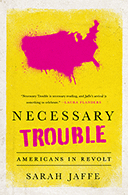The Supreme Court and the corporate class, with Saqib Bhatti
The Supreme Court last week handed down decisions in Trump’s Muslim ban case, in the public sector labor union case Janus v. AFSCME, and more, decisions that will harm working people, particularly people of color. But most of the time these decisions are talked about separately from one another, and from other Trumpist attacks on immigrants and working people. Saqib Bhatti of the Action Center on Race and the Economy (ACRE) joins me to talk about them all together, contextualizing the slant of the Supreme Court these days and the shape of the struggle to fight back.
Looking at these issues, what is really important to understand is the connections between “Who are the corporate actors that are actually bad across all of these issues?” One of the things that we are seeing is with a lot of these things, the thing that people love to do with the Muslim ban is really beat up on Trump or say, “This is a terrible decision by the Supreme Court,” but the reality is we can raise those concerns all we want and it doesn’t actually hurt Trump for us to be saying, “He is anti-Muslim, he is racist.” In fact, it actually helps him with his base. With a lot of the politicians we are seeing that the reason why they are actually appealing to white supremacists is because they realize that it actually helps them. The way for us to take them on, while it is important to call out those politicians for what they are and what they are doing, we can’t stop there because at the end of the day that is not going to be an effective way to move them. Especially now if we are seeing the Supreme Court that in the coming years is likely to be stacked by far right ideologues, it seems like the avenue to fight on these fights only in the discourse of public sector and government is going to be going away. That is why it is truly important to look at, “Who are the corporations that these politicians are beholden to? Who are the corporations whose agenda the Supreme Court is carrying out?” and really show some of these connections. What we have found in our research is that a lot of the same companies that are really profiting off the mass incarceration system, that are really profiting from our immigrant policies, that are supporting politicians that are anti-Muslim and support policies like the Muslim ban, these are actually a lot of the same corporations, and by the way, those are also the same corporations that are responsible for defunding the public sector because they don’t pay their fair share in taxes.
Up at Truthout
Up at The Progressive
Up at In These Times.
Interviews for Resistance is a syndicated series of interviews with organizers, agitators and troublemakers, available twice weekly as text and podcast. You can now subscribe on iTunes! Previous interviews here
